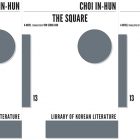We Read Our Lives Wherever We Can

What happens when you read to manifest, rather than escape, your preoccupations?
I read Kristin McCloy’s Some Girls in 2002, the fall I moved from my parents’ house in suburban Virginia to a dorm room in East Lansing. In the book, 23-year-old Claire moves to New York to find herself, leaving her mother, sister, and stoic rancher boyfriend behind in Alamogordo, New Mexico. As a fresh transplant, Claire missteps: sleeping with the wrong person, recoiling into social isolation, indulging the fear that she never should’ve moved. But as Claire becomes fascinated with her urbane neighbor Jade, she reencounters both the city and herself through the fresh lens of love.
In McCloy’s hands, the story’s potentially dreary oppositions—desert country vs. urban city, innocence vs. experience, safe familiar boyfriend vs. exotic queer affair—are rendered with the complexity and detail necessary to draw out tension, rather than come down reductively on one side or another. And this, the book argues, is the nature of homesickness: less a longing for some particular elsewhere, than an irreconcilable tension between wherever you are and where you thought you’d be.
I never knew New York in 1989, never ate steaming dumplings for breakfast in Chinatown or waited for a temp assignment in a room of identically desperate girls. But after leaving my hometown for a place where I knew no one, that was the story I needed, the story by which I felt understood.
Last weekend, after a month teaching and traveling in Ireland, I flew home through JFK and spent the afternoon at Rockaway Beach finishing Colm Tóibín’s Brooklyn. Known broadly for its lauded film adaptation, Brooklyn tells the story of a young woman who emigrates to New York from Enniscorthy, Ireland to better her (presently nonexistent) job prospects. Like Claire, Brooklyn’s Eilis leaves a mother and sister behind, and from across the Atlantic, she comes to recognize the dual character of her former home, to see its relative constrictions as clearly as its comforts.
It was there on the beach turning Tóibín’s last pages that I was struck by the eeriness of what I was doing given what I was reading: lying on a towel in Queens, having that same morning enjoyed my last chicken and stuffing sandwich in Dublin Airport, feeling unceremoniously cut from that place and spirited into this one. Vast differences in circumstances and modes of transport notwithstanding, it felt uncanny, insofar as it felt strangely literal.
And it made me think of Some Girls, not (only) because McCloy’s novel and Brooklyn plot much of the same story set 40ish years apart, but because that was another distinct time when I remembered myself reading something that resembled, perhaps primitively but unmistakably, the current status of my actual life.
Between the distractive category of “beach reads” and the notion of escapist genres, we have a fair amount of tools for thinking about literature as transporting. Sometimes, as was the case when I consumed the Twilight franchise an hour at a time every night before bed, reading can be tantamount to a mental colonic—and the diversion from real life may be welcome, even therapeutic.
But other times, we find ourselves choosing narratives that allow us to tunnel deeper into, rather than away from, whatever’s actually going on. This was me reading Michael Chabon’s The Mysteries of Pittsburgh after signing my first lease in Regent Square, scanning new sunsets for proof of “an orange so tortured and final.” This was also me reading Some Girls alone in the cafeteria, steeling myself to walk among strangers with the confidence Claire apes from seasoned New Yorkers, “stepping so close to the cars they had to tilt their hips back to keep from grazing the door handles, the look on their faces professional as bullfighters.” And, last weekend, this was me looking out an airplane window at the air between places, as Eilis saw:
“She was nobody here. It was not just that she had no friends and family; it was rather that she was a ghost in this room, in the streets on the way to work, on the shop floor. Nothing meant anything. The rooms in the house on Friary Street belonged to her, she thought; when she moved in them she was really there. In the town, if she walked to the shop or to the Vocational School, the air, the light, the ground, it was all solid and part of her, even if she met no one familiar. Nothing here was part of her.”
There’s more to this reading practice than perpetuating a narcissistic gesture. Stories, too, time travel to find us, to articulate us back to ourselves, even before we realize that the window is a mirror. In this last stretch of summer, between closing one book and reaching for another, I’m thinking of the call to receptivity—to a kind of auto-literacy—in the last stanza of Agnes McDonald’s “Text”:
We read our lives wherever we can,
even the sad or long or badly written.
A sudden turn of the head is all
it takes to miss what we might
spend the rest of it,
looking for.



